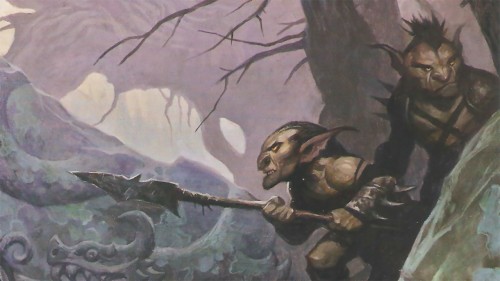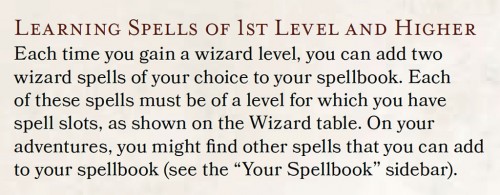It’s a bit early, what with the Player’s Handbook not having shipped, but with Wizards of the Coast having released a 110-page PDF of the new Dungeons & Dragons Basic Rules and a Starter Set box with a neat litle adventure, we’ve got a pretty good amount of material to get off the fence, set aside our hipster indy RPGs for a while, and return to the mothership for a while.
I understand that it’s cool to disdain Dungeons & Dragons. Perhaps even more so if you are a long-time pen & paper roleplaying gamer. There are myriad reasons for this, ranging from the compelling and legitimate to utterly petty and childish. I don’t care whether you’re ironically or unironically against Dungeons & Dragons of any particular flavor. In my mind, every RPG you play is just D&D with house rules. Some house rules make the game more simple, some make the game more complicated. Many change the core themes of play. But if I were playing with your group, I’d tell my wife and kids that I was heading out to play some D&D with my friends. So when somebody releases a new system under the Dungeons & Dragons trademark I go and check it out. Out of habit, perhaps. Perhaps because I’ve thoroughly enjoyed every version of Dungeons & Dragons so far. At least when I first picked it up. Unlike other brands in the hobby, Dungeons & Dragons never seems to lose its shine and appeal until it’s been played a bunch.
Which brings us to the new & shiny version. From the material we’ve seen, 5th edition is bringing a few interesting new elements to the classic game. In part this is meant to reconcile the play styles of several older editions. This has fans of older versions seeing spectres of newer versions. It has fans of newer versions seeing hobgoblins of older versions. They’re correct in many of the particulars. Aspects of 1st and 2nd edition AD&D are present. Aspects of 3rd edition are present. Elements of 4th edition are there, too. New character background, bonds, and inspiration mechanics even tie in material that I associate with independent pass-the-talking-stick storytime games. Depending on how well the full system ties all these together will have a huge impact on how fun the game will be to play, how well it will facilitate DMs running the game, and how well the brand will fare going forward.
One of the important roles of a Dungeon Master has always been to adjudicate the rules, to decide how they should be interpreted and implemented in a particular story, to create new rules to deal with unforeseen circumstances, and to ignore rules that are deemed counterproductive. This has been the case since Gary Gygax and Dave Arneson killed their first orc. The result is that every Dungeon Master and his group ends up playing a different version of the game than every other group. Each has his own house rules, a kind of informal set of precedents and traditions that help players predict how the story will work. In some groups, magic swords glow constantly. In some group, magic weapons only glow with held by a person. In others, they don’t generally glow at all. I’ve seen play groups general hundred-page printouts of their campaign’s various house rules.
The first house rule I expect to implement is related to the following blurb, as presented in the Basic Rules PDF on page 31:
It is my long-held belief that, in most editions of Dungeons & Dragons, spellcasters have to be handled with care by both the player and the DM. They have to walk a tightrope between being fragile and being stupendously overpowered. A Wizard or Cleric can frequently render other characters superfluous. They can slay many enemies, circumvent many perils, and generally solve most problems and adventurer might face with no assistance from other characters. In a game where the spotlight ought to be shared and every player would like an opportunity to save the day every once in a while, this is problematic. The rule quoted above grants a Wizard the ability to pick any two spells he wants when he gains a level. Depending on the story at hand, some spells have the potential to bypass entire adventures, throwing a wrench into the Dungeon Master’s plans and depriving the whole group (including the Wizard’s player) of hours of entertainment.
A simple solution: remove the free spells when a Wizard gains a level. If you want new spells, look back to the ancient tradition of raiding some other Wizard’s spellbook or scrolls. This can be somewhat problematic if you start a Wizard character; which cantrips and 1st level spells should he have access to? If starting a Wizard at a higher level, the list of commonly-available spells would need to broaden as well.
This can also be an issue for Clerics, who are generally understood to know how to pray for whatever miracles their deities are willing to grant. The Basic Rules PDF grants Clerics access to every Cleric spell in the book the moment they are powerful enough to cast them. They are limited almost entirely to what they player has the foresight to prepare in advance. If we end up finding that Clerics are as potent in 5th edition as they have been in Pathfinder or 3rd edition, it may be a good idea to come up with a “common book of prayers” that any Cleric of a given faith would have access to. This may require coming up with a “researching a spell from scratch” system that I’ll probably base on whatever the rules for making magic items are.
The second house rule will be to modify the combat maneuvers from the Battle Master archetype found in a leaked closed-playtest document and make them the model for improvised actions by anybody, not just a subset of Fighters. I suspect the final published version of the rules will do something similar anyway, so folding this house rule into the proper rules should require a minimum of fuss and muss.
Also, no feats. If there’s one thing I grew to detest in 3rd edition, 4th edition, Pathfinder, and other Dungeons & Dragons clones, it’s feature creep, trap options, and general bloat through the “feats” system. I was tickled to see them considered optional by default.


I forget where I recently saw it, but some grognard on some OSR blog put forth the following for cleric spells:
If a player gets X spells per level, where X is greater than one, then they pick all but one of the spells. The GM (aka feckless and uncaring supreme being) picks the last one. Perhaps even rolling off a chart of all cleric spells, numbered via percentile dice.
the one thing I’ve liked so far, reading the Dungeon Crawl Classics rules are the “use randomness as the great equalizer, rather than making the game ‘balanced’.”
I’m increasingly a fan of using “one moment, I’ve got a table for this…” as a wait of artificially ratcheting up the tension in a group. All I meant to do was open up a kitchen cabinet. What could possibly be in there that requires a table? Am I going to die?
In a recent game session I accidentally rolled a dice behind my screen… what happened is I was moving it out of the way and dropped it. The players all got tense. It was great.